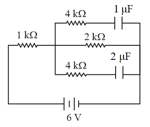Capacitors and Capacitance
Capacitors and Capacitance: Overview
This topic covers concepts, such as Capacitor and Its Capacitance, Relation between Charge on a Conductor and Change in Its Potential, Factors Affecting Capacitance, Dielectric Strength of an Insulator, Unit of Capacitance, Use of Capacitor, etc.
Important Questions on Capacitors and Capacitance
Calculate final charge on capacitor:
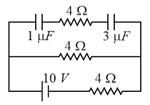
In a capacitor which is initially charged such that the left plate of capacitor has charge and the right plate has zero charge at time . The total charge on the right plate after closing the switch will be
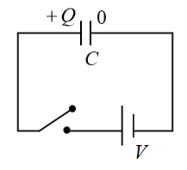
Find the potential drop across the capacitor when the circuit given below achieves steady-state.
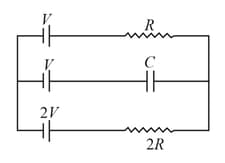
Calculate the charge on a capacitor of capacitance and charged to a voltage .
When the charge on a capacitor increases keeping geometry the same
A parallel plate condenser is filled with two dielectrics as shown in the figure. The area of each plate is and the separation is d metre. The dielectric constants are and respectively. Its capacitance in farad will be-
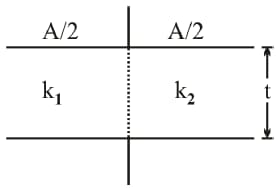
Effective capacitance of parallel combination of two capacitor and is . When we inserted a dielectric slab between the plates the new capacitance will be ( dielectric constant )
A parallel plate capacitor of capacitance . A dielectric slab of thickness is inserted between the plates. Then new capacitance is given by-
A dielectric slab of thickness is inserted in a parallel plate capacitor whose negative plate is at and the positive plate is at The slab is equidistant from the plates. The capacitor is given some charge. As goes from to then,
The electric potential increases at first, then decreases and again increases.
The electric potential increases continuously.
The direction of the electric field remains the same
The magnitude of the electric field remains the same
A capacitor is charged using a battery, and the battery is withdrawn later on. Now a dielectric slab is introduced between the capacitor plates then the correct statement is-
A parallel plate air capacitor is charged by connecting its plates to a battery. Without disconnecting the battery, a dielectric is introduced between its plates. As a result-
The value of a capacitor formed by a thin metallic foil is The foil is folded with a layer of paper having a thickness of The dielectric constant of the paper is and its breadth is The length of the foil used is-
A sheet of aluminium is inserted in the air gap of a parallel plate capacitor without touching any of the two plates of the capacitor. The capacitance of the capacitor is-
A parallel plate capacitor is first charged and then disconnected from the battery and then a dielectric slab is introduced between the plates. The quantity that remains unchanged is
The distance between the plates of a parallel plate capacitor is A copper plate of the same area but thickness is placed between the plates then the new capacitance will become-
In the following figure, the charge on each condenser in the steady state will be-
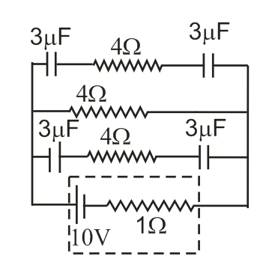
A parallel plate capacitor is charged and then isolated. On increasing the plate separation-
A capacitor of is charged to such an extent that the potential difference between the plates becomes . The work done in this process will be,
A capacitor is charged to and then its plates are joined through a resistor of resistance . The heat produced in the resistor is,
What are the charges stored in the and capacitors in the circuit below, once the currents become steady
